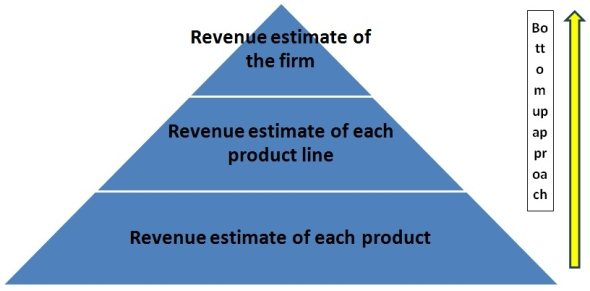- Business Concepts ›
- Marketing and Strategy ›
- Bottom Up Forecasting
Bottom Up Forecasting
Definition & Meaning
This article covers meaning & overview of Bottom Up Forecasting from marketing perspective.
What is meant by Bottom Up Forecasting?
Forecasting is the process of projecting future estimates from the given data or or factors of growth. This helps the companies to know the cash flows and the needs in the later periods.
There are two types of forecasting:
a) Top down fore casting
b) Bottom up forecasting
Bottom up approach follows the reverse approach for top down where we calculate the potential revenue by multiplying the potential sales and the average sales value. After evaluating the potential revenue of each product or product line, we calculate the revenue estimate of the entire firm.
Strengths of bottom up forecasting:
Focus on specific categories of expenditure, output and revenue which would be necessary to plan and manage other individual activities like production capacity, employee hiring/salary, advertising expenses etc.
Weakness of bottom up forecasting:
While forecasting, some errors at more specific levels (basic assumptions) can result into incorrect results or random patterns in the perspective of the firm. This may result in excessive spending or overestimating profits in the long run.

This article has been researched & authored by the Business Concepts Team which comprises of MBA students, management professionals, and industry experts. It has been reviewed & published by the MBA Skool Team. The content on MBA Skool has been created for educational & academic purpose only.
Browse the definition and meaning of more similar terms. The Management Dictionary covers over 1800 business concepts from 5 categories.
Continue Reading:
What is MBA Skool?About Us
MBA Skool is a Knowledge Resource for Management Students, Aspirants & Professionals.
Business Courses
Quizzes & Skills
Quizzes test your expertise in business and Skill tests evaluate your management traits
Related Content
All Business Sections
Write for Us